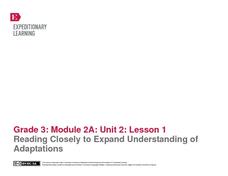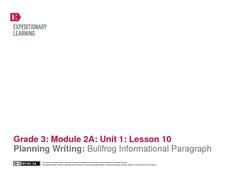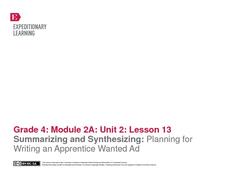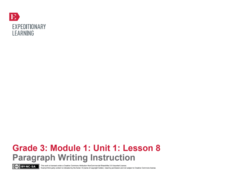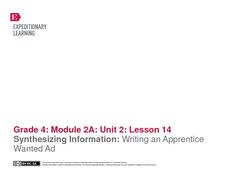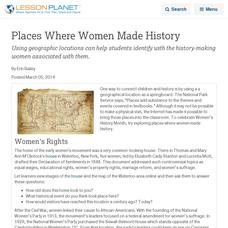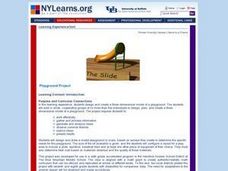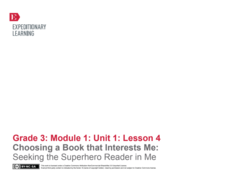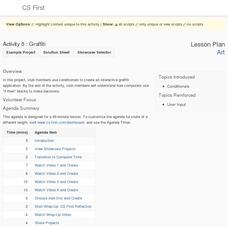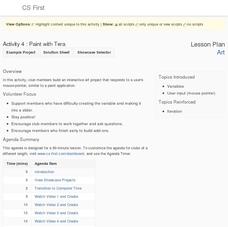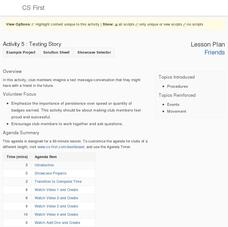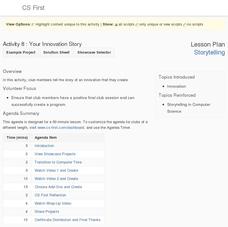Curated OER
Get-together, Meeting and Reunion Exercise
For this recognizing vocabulary usage in context worksheet, learners read the meanings of get-together, meeting, and reunion and use them to fill in the blanks in sentences. Students write 12 answers.
Curated OER
Using Current Events to Understand Elections
Eleventh graders explore the the major phases of the electoral process for president. For this US Government lesson, 11th graders compare and contrast the delegate system of nomination and the electoral college.
EngageNY
Continued Close Reading of Nasreen's Secret School: Discussions of Questions and Evidence
Third graders answer text-dependent questions of the story Nasreen's Secret School both independently and then collaboratively through using the carousel of questions strategy. This plan is the seventh instructional activity in a...
EngageNY
Documenting Research: Sorting and Recording Information About the Wheelwright
Fourth graders practice using a graphic organizer to record their notes and answer text-dependent questions while supplying evidence of how they found their answer. They focus on a machine called the wheelright, which was commonly...
EngageNY
Reading Closely to Expand Understanding of Adaptations
Third graders work to determine the main idea, recall key details, and answer questions using an informational text on the topic of animal adaptations. Using the non-fiction text "Staying Alive: Animal Adaptations" (provided) the teacher...
EngageNY
Mid-Unit 2 Assessment: Inferring About the Silversmith Trade in Colonial Times
The seventh lesson plan in this unit on colonial trade assesses fourth graders' ability to use details from an informational text to make inferences and create a piece of informative writing. The included assessment begins with learners...
EngageNY
Planning Writing: Bullfrog Information Paragraph
Lesson ten in this unit for the book Bullfrogs at Magnolia Circle, prepares third graders to begin writing an informational paragraph about the adaptations of bullfrogs. First, young writers work either independently or in pairs to...
EngageNY
Developing Reading Fluency: Beginning the End of Unit 2 Assessment
Third graders continue to develop their reading fluency in preparation for their assessment in the tenth lesson plan of this unit. Young readers are provided with a short passage on Helen Keller, which they use while working in pairs...
Curated OER
Lesson: Younger Than Jesus: Understanding, Looking at, Making Abstract Art
Before the class makes abstract art, they see contemporary examples and analyze them. They look at art made by abstract artists under the age of 33 then use similar techniques to create an interesting collection of their own. The lesson...
EngageNY
Summarizing and Synthesizing: Planning for Writing an Apprentice Wanted Ad
In instructional activity 13 of this unit on colonial trade, young researchers learn about apprentices as they prepare to write help-wanted ads for the specific trade they have been researching. To begin, the class listens closely as the...
EngageNY
Paragraph Writing Instruction
Writing a paragraph from details found directly in a text is the central focus of this thorough and explicit lesson plan. Using the stories Nasreen's Secret School and Rain School, third graders are lead step-by-step...
EngageNY
End of Unit 2 Assessment: Working with Two Texts - Reading, Listening, Summarizing, and Synthesizing
As a summative assessment for this unit on colonial trade, fourth graders listen to and read informational texts in order to demonstrate their ability to take notes, write summaries, and draw connections. Young scholars first listen as...
EngageNY
Synthesizing Information: Writing an Apprentice Wanted Ad
Fourth graders view examples of help-wanted ads as they plan and create their own writing in the fourteenth instructional activity of this unit on colonial trade. The engagement of the class is captured when the teacher shares an actual...
EngageNY
Synthesizing Research: How Colonists Were Interdependent
Following the formative assessment of this unit, young scholars present the information they gathered on their specific colonial trade to the rest of the class. Working in groups, learners create posters describing the particular job...
Curated OER
Places Where Women Made History
Using places can help students identify with the history-making women associated with them.
Curated OER
Math: Designing a Playground
Sixth graders design and draw a model playground to scale. They configure the layout to include a sandbox, slide, baseball field and other equipment. Their design includes adaptations for students with disabilities. Their designs are...
EngageNY
Choosing a Book That Interests Me: Seeking the Superhero Reader in Me
Selecting a "power book" and engaging in a structured class discussion are the learning targets for this fourth lesson in a larger unit. It is designed as a beginning of the year unit for establishing norms and routines in the classroom....
EngageNY
Listening Closely and Taking Notes in Expert Groups: Colonial Trade Podcast
The twelfth instructional activity of this unit builds on the skills developed in the previous instructional activity, as fourth graders continue their quest to become experts on colonial trade by listening to interviews with historical...
Annenberg Foundation
Becoming Visible
The television and interstate highways both came of age in 1950s America. Scholars use film, text, and discussion to explore how these and other cultural icons shaped the literature of the time. Pupils also create a family history...
Google
Art: Digital Art
There's no need to filter out the project. Future computer scientists set up a program that acts like a photography filter to complete the sixth of eight parts in the Google CS Art unit. They use the turbo mode in the Scratch coding...
Google
Art: Graffiti
Your principal won't mind graffiti, as long as it's on a virtual wall. Scholars use the Scratch block-based computer language to write a program on graffiti. The program lets users place certain designs on a wall.
Google
Art: Paint with Tera
Here's a creative resource that definitely isn't paint by numbers. As the fourth in and eight-part Art series, learners create a paint program using the Scratch block code. By completing the activity, class members come to understand the...
Google
Friends: Texting Story
Sometimes it's okay to text in school. Young computer scientists work in the Scratch program to write a text message conversation among friends. They use different sprites within the program to represent each side of the conversation to...
Google
Storytelling: Your Innovation Story
Explore a trailblazing way to talk about innovation. Using the Scratch coding program, young computer scientists create innovations and write stories to accompany them. They include some of the add-ons they mastered throughout the unit.




